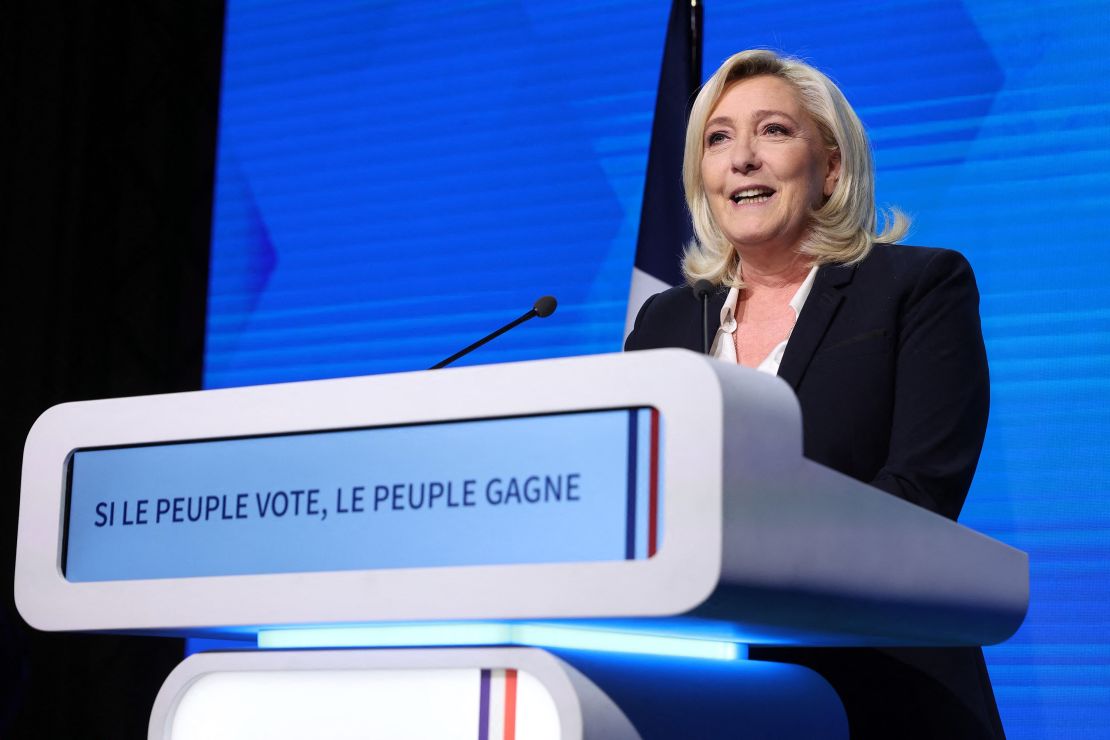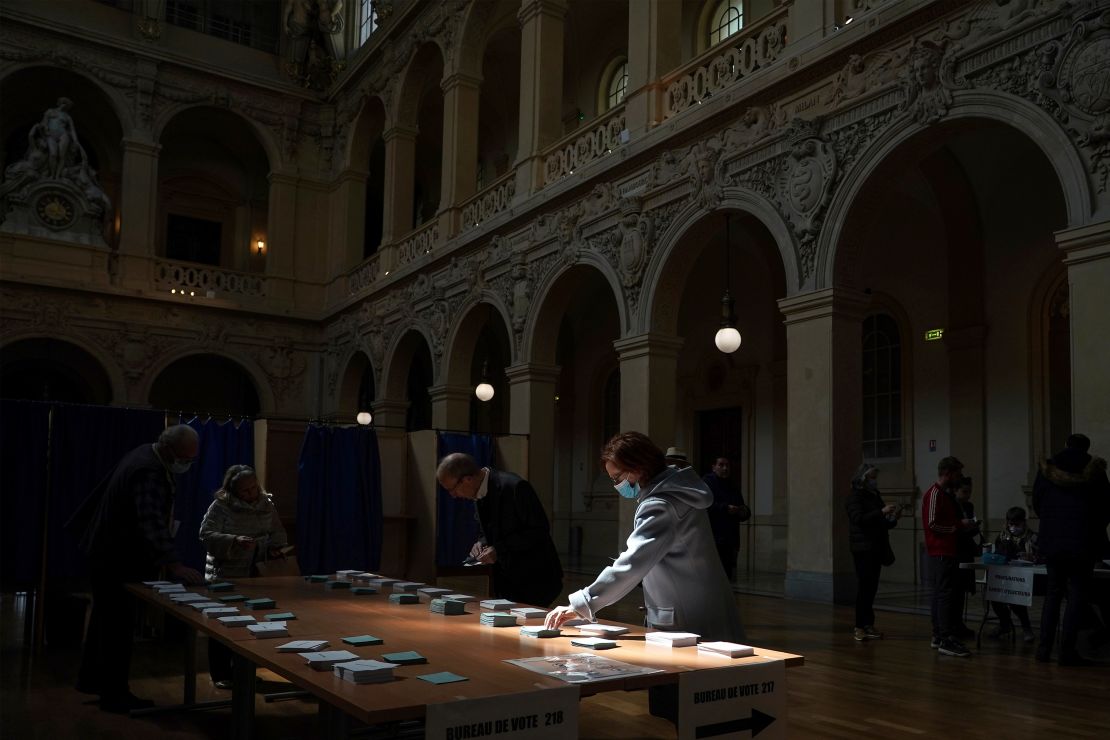French President Emmanuel Macron will face Marine Le Pen in the second round of the country’s presidential election, setting up a rematch of their runoff contest in 2017.
Centrist Macron and Le Pen, a long-time standard-bearer for the French far-right, were the top two candidates in the first round of Sunday’s vote, picking up 27.8% and 23.2% of the ballots respectively, according to the French Interior Ministry.
Twelve candidates ran for the top job. Since none of them received more than 50% of the ballots in the first round, the top two candidates will face each other in a runoff on April 24.
The first round of the 2022 contest was marked by voter apathy, with participation estimated at 73.3%, according to an analysis by pollster Ifop-Fiducial for French broadcasters TF1 and LCI – the lowest in a first round in 20 years.
While Macron received more votes than any of the other candidates in the first round, he is a polarizing figure whose approval rating has sagged during his first term.
In a speech after polls closed on Sunday, he urged citizens to vote in the second round.
“Nothing is settled and the debate that we will have in the coming 15 days is decisive for our country and our Europe,” he said. “I don’t want a France which, having left Europe, would have as its only allies the international populists and xenophobes. That is not us. I want a France faithful to humanism, to the spirit of enlightenment,” he said.
Macron is seeking to become the first French president to win reelection since Jacques Chirac in 2002. Polls have given him a consistent edge over the rest of the field, but the race has tightened significantly in the past month.
Polling by Ifop-Fiducial released on Sunday showed that Macron would win a second-round contest against Le Pen by just 51% to 49%.
Le Pen’s support has steadily risen in recent weeks. Though she is best known for her far-right policies such as drastically restricting immigration and banning Muslim headscarves in public places, she has run a more mainstream campaign this time around, softening her language and focusing more on pocketbook issues like the rising cost of living, a top concern for the French electorate.

In her speech Sunday, Le Pen vowed to be a president for “all the French” if she wins the second round, and called on those who didn’t vote for Macron to support her in the second round.
Leftist firebrand Jean-Luc Melenchon came third, with 22% of the vote. He enjoyed a late surge in support and was considered a possible dark horse candidate to challenge Macron.
Who Melenchon’s voters choose to back in the second round could decide the presidency, experts say. Melenchon told his supporters that “we must not give a single vote to Mrs. Le Pen,” but did not explicitly back Macron.
No other candidate received more than 10% of the votes. Far-right political commentator turned presidential candidate Eric Zemmour, who enjoyed a seat among the top three candidates until March, according to Ifop polling, came in fourth at7.1%.
The other candidates on Sunday’s ballot have quickly begun throwing their weight behind the top two. While Zemmour called on his backers to vote for Le Pen, the others urged their supporters to steer clear of her.
The candidates from the traditional center-left and center-right parties, the Socialists and the Republicans, have already backed Macron.
Socialist Anne Hidalgo said a Le Pen victory would instill in France “a hatred of everyone set against everyone,” while Republican Valerie Pecresse said she was sincerely worried for the country because “the far right has never been so close to winning.”
“The project of Marine Le Pen will open France to discord, impotence, and collapse,” said Pecresse.

The rematch
Macron’s political rise shattered the playing field, as his centrist political party has pulled supporters away from the traditional centrist parties, the Socialists and the Republicans. Both its candidates polled under 5% on Sunday.
Surveys ahead of the race showed that a second round of Macron vs. Le Pen was the most likely outcome. Macron handily beat Le Pen five years ago, but experts have said that a second contest between the two would be much tighter than the 2017 race.
Macron is no longer a political upstart and must run on a mixed record. While his ambitious plan to bolster the European Union’s autonomy and geopolitical heft won him respect abroad and at home, he remains a divisive figure when it comes to domestic policies. His handling of the yellow vest movement, one of France’s most prolonged protests in decades, was widely panned, and his record on the Covid-19 pandemic is inconclusive.
Macron’s signature policy during the crisis – requiring people to show proof of vaccination to go about their lives as normal – helped increase vaccination rates but fired up a vocal minority against his presidency.

Macron has, so far, done very little campaigning. Experts believe his strategy was to avoid the political mudslinging as long as possible to brandish his image as the most presidential of all the candidates. Polling showed him consistently leading all candidates, and he was considered a shoo-in to make the second round.
“The widespread dissatisfaction with Macron (especially among the young) means that the outcome is uncertain and unpredictable. Le Pen will continue to exploit this, and a major political upset therefore remains possible,” said CNN European affairs commentator Dominic Thomas of the second round matchup.
“However much they may dislike Le Pen, there is a world of difference between her and Macron, and how she would disrupt European and global politics.”
Le Pen is the daughter of another famous far-right presidential candidate, Jean-Marie Le Pen. The elder Le Pen made it to the runoff against Jacques Chirac in 2002, but Marine Le Pen has managed to perform better than her father in the first round of each of the past two presidential elections.
Le Pen has tried to portray herself as a very different candidate to the one who lost to Macron in 2017, when she attempted to position herself to the forgotten French working classes as her country’s answer to then-US President Donald Trump. While her economic nationalist stance, views on immigration, euroskepticism and positions on Islam in France are unchanged, Le Pen has sought to broaden her appeal.
The contest was at first predicted to be a referendum on the dominance of the extreme right in French politics, but the war in Ukraine – another key issue for voters – upended the race.
According to Ifop polling, Macron’s support peaked in early March, as potential voters rallied around the flag and rewarded the president for his attempts to mediate the conflict in Ukraine before Russia’s invasion, even if it was a failure.
Many experts also expected the war to hurt the Le Pen, who had been a vocal admirer of Vladimir Putin, the Russian leader who has become a pariah in the West due to the Kremlin’s decision to invade Ukraine in late February. Le Pen visited the Russian president during her 2017 campaign; this time around, she was forced to scrap a leaflet with a photo of her and Putin from that trip after Russia’s unprovoked attack on its neighbor.
Thomas, the CNN European affairs commentator, explained that the forthcoming debates will be crucial if Macron is to convince voters that Le Pen’s previous support for Putin should disqualify her.
“He will be vulnerable on a range of domestic issues, but she will have difficulty convincing the electorate of her foreign policy credentials, especially given her longstanding links with Russia,” he said.
CNN’s Xiaofei Xu and Camille Knight contributed to this report
















